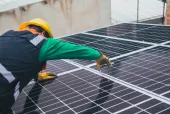
Thai paper firm creates energy business
Pulp and paper company Double A created a renewable energy business under the name National Power Supply Plc. The said entity is committed to run the business under the principle of sustainable development to benefit the community and the country.
National Power Supply Plc. or NPS has power plants that produce electricity from residual wastes such as bark, husk, wood scraps and black liquor from pulp and paper production. This made NPS to be a model of renewable energy power plant for more than 20 years. Also NPS has another power plant that use coal and bio-mass to produce electricity for more than a decade. This plant uses clean technology such as Circulating Fluidized Bed boiler, which can be operated by using various fuels to create sustainable energy instead of gas and oil which are non-renewable sources.
“With this clean technology we can control air pollution better than the industry standard. We recently received a credit agreement from Krung Thai Bank Plc. to build a new renewable energy plant with a capacity of 125MW of electric power. We expect to distribute the electricity generated from this new plant in 2014,” said Mr.Apichai Sawpitiporn Senior Executive Vice President of National Power Supply Public Company Limited.
Mr. Apichai added, “The business concept of NPS is we aim to generate the renewable energy from wastes under the principle ‘No waste is wasted’. To take a responsibility on environment, NPS can also generate a sustainable source of renewable energy by encouraging Thai farmers to plant energy by planting trees and generate renewable raw material instead of using natural fuel and gas which are nearly scarce. In this concept we can help produce renewable energy and help reduce the global warming issue as well.”
In addition, NPS has selected a strategic location for its plant which is far away from the crowded industrial area. NPS efficiently managed its logistics system such as transporting paper trees from the community, delivering paper to customers and transporting bio-mass fuel to power plant for electricity generation using GPS tracking system.
NPS continually supports a Community Development Fund, soon to be known as Electric Energy Development Fund, following the Government’s Policy.
Moreover, NPS is now conducting to develop its 600 megawatt power plant, a project of Independent Power Producer : IPP to satisfy the country’s high demand for electricity. It adheres to sustainable development among community, economic and environmental for reducing any natural gas and oil consumption, selecting environmentally friendly clean technology and aims to support the community in education, health and livelihood programs.













 Advertise
Advertise











